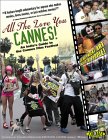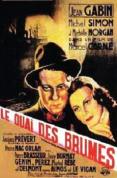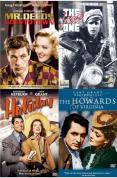![Pepe Le Moko [1936]](/pictures/1012039.jpg) Pepe Le Moko | DVD | (23/02/2004)
from £N/A
| Saving you £N/A (N/A%)
| RRP
Pepe Le Moko | DVD | (23/02/2004)
from £N/A
| Saving you £N/A (N/A%)
| RRP Infatuated by the woman... dazzled by the diamonds! A French crook seeks refuge in Algeria but love gets him killed.
 Stolen Kisses | DVD | (24/08/1999)
from £N/A
| Saving you £N/A (N/A%)
| RRP
Stolen Kisses | DVD | (24/08/1999)
from £N/A
| Saving you £N/A (N/A%)
| RRP  All the Love You Cannes | DVD | (24/06/2003)
from £N/A
| Saving you £N/A (N/A%)
| RRP
All the Love You Cannes | DVD | (24/06/2003)
from £N/A
| Saving you £N/A (N/A%)
| RRP  Love on the Run | DVD | (11/05/1999)
from £N/A
| Saving you £N/A (N/A%)
| RRP
Love on the Run | DVD | (11/05/1999)
from £N/A
| Saving you £N/A (N/A%)
| RRP ![La Peau Douce [1964]](/pictures/1033402.jpg) La Peau Douce | DVD | (11/02/2002)
from £N/A
| Saving you £N/A (N/A%)
| RRP
La Peau Douce | DVD | (11/02/2002)
from £N/A
| Saving you £N/A (N/A%)
| RRP In director Francois Truffaut's dramatic film 'La Peau Douce' Pierre is a successful happily married publisher who meets Nicole a lovely airplane stewardess and begins a lustful affair with her. As his passion deepens he realizes he must choose between his wife Franca and his mistress. However the movie takes a suprising twist leading to one of the most startling conclusions in film history...
![Stephane Grappelli - Fascinating Rhythm [Dutch Import]](/pictures/1045212.jpg) Stephane Grappelli - Fascinating Rhythm | DVD | (16/08/2004)
from £4.75
| Saving you £27.01 (85.00%)
| RRP
Stephane Grappelli - Fascinating Rhythm | DVD | (16/08/2004)
from £4.75
| Saving you £27.01 (85.00%)
| RRP Stephane Grappelli - Fascinating Rhythm
 Port of Shadows | DVD | (02/04/2007)
from £N/A
| Saving you £N/A (N/A%)
| RRP
Port of Shadows | DVD | (02/04/2007)
from £N/A
| Saving you £N/A (N/A%)
| RRP On a foggy highway a lonely soldier hitches a ride and ends up in a lonely bar on the outskirts of town. The soldier (Jean Gabin) a deserter on the run meets sad runaway Nelly (Michele Morgan) and falls in love. He becomes entwined in the troubles of her life notably the lascivious guardian (Michel Simon) who lusts after Nelly and attempts to blackmail Jean and a cocky hot-headed gangster (Pierre Brasseur) who tries to scare Jean off.
![Flash Gordon - The Definitive Collection [1936]](/pictures/1069982.jpg) Flash Gordon - The Definitive Collection | DVD | (07/05/2007)
from £N/A
| Saving you £N/A (N/A%)
| RRP
Flash Gordon - The Definitive Collection | DVD | (07/05/2007)
from £N/A
| Saving you £N/A (N/A%)
| RRP  Jean Simmons Collection - How To Make An American Quilt/Spartacus/Divorce American Style/A Bullet Is Waiting | DVD | (24/09/2007)
from £N/A
| Saving you £N/A (N/A%)
| RRP
Jean Simmons Collection - How To Make An American Quilt/Spartacus/Divorce American Style/A Bullet Is Waiting | DVD | (24/09/2007)
from £N/A
| Saving you £N/A (N/A%)
| RRP How To Make An American Quilt (Dir. Jocelyn Moorhouse 1995): Berkeley graduate student Finn (Winona Ryder) is spending the summer at the home of her sparring grandmother and great aunt (Oscar-winners Ellen Burstyn & Anne Bancroft). Their house is a quiet haven where Finn intends to finish her latest thesis and think over a marriage proposal. But when she meets sexy smoldering Leon things begin to get complicated. As she wrestles with her decision the women in her grandmothe
 Gluck - Orpheus and Eurydice: Opera in 3 Acts | DVD | (17/07/2006)
from £N/A
| Saving you £N/A (N/A%)
| RRP
Gluck - Orpheus and Eurydice: Opera in 3 Acts | DVD | (17/07/2006)
from £N/A
| Saving you £N/A (N/A%)
| RRP  Mr. Deeds Goes to Town/Wild One/Holiday/the Howards of | DVD | (12/11/2007)
from £N/A
| Saving you £N/A (N/A%)
| RRP
Mr. Deeds Goes to Town/Wild One/Holiday/the Howards of | DVD | (12/11/2007)
from £N/A
| Saving you £N/A (N/A%)
| RRP Mr Deeds Goes To Town (1936): Gary Cooper is the pixilated small-town resident who refuses to let a million inheritance and a New York mansion alter his down-to-earth faith in people in Frank Capra's delightful comedy. Jean Arthur co-stars as the cynical reporter who falls for Deeds. Wild One (1954): Brando plays Johnny the leader of a vicious biker gang that involves a small sleepy California town. The leather-jacketed young biker seems hell-bent on destruction until he falls for Kathie (Mary Murphy) a good-girl whose father happens to be a cop. Unfortunately for Johnny his one shot at redemption is threatened by a psychotic rival Chino (Lee Marvin) plus the hostility and prejudice of the townspeople. All their smouldering passions explode in an electrifying climax. Holiday (1938): An iconoclastic young man (Cary Grant) who's engaged to a snooty heiress (Doris Nolan) discovers he's really in love with his fianc''e's down-to-earth sister (Katharine Hepburn) in director George Cukor's stylish comedy... The Howards Of Virginia (1940): Leading man Cary Grant plays Matt Howard a common man who gains employment as a surveyor through the help of Thomas Jefferson. Howard quickly falls head over heels for his wealthy employer's daughter Jane Peyton (Martha Scott). The couple appear to be set for happiness until Matt becomes involved in politics and the War of Independence arrives...
 Knock Off/Double Team/Desert Heat/Nowhere to Run | DVD | (12/11/2007)
from £N/A
| Saving you £N/A (N/A%)
| RRP
Knock Off/Double Team/Desert Heat/Nowhere to Run | DVD | (12/11/2007)
from £N/A
| Saving you £N/A (N/A%)
| RRP Knock Off (1998): When a shipment of jeans to the US proves counterfeit Marcus Ray the King of the Knock-Offs (Van Damme) finds himself at the centre of a Russian Mafia plot to hold the United States' security for ransom. Thousands of tiny micro-bombs disguised within other manufactured goods are schedules for departure from Hong Kong to America. When Ray's company's jeans are found to be the housing for the explosives he's the one man the CIA can count on to prevent certain disaster! In a territory where loyalty can change hands overnight Marcus Ray's survival will depend on him knowing the fakes from the real thing! Double Team (1997): Though he's the nation's top counter-terrorist Jack Quinn (Jean-Claude Van Damme) wants to get out of the spy game. But on his final mission he misses his target and wakes up in a place they call the Colony a think tank for spies who are too dangerous to roam the world but too valuable to be killed. With his target the dangerous enigmatic terrorist Stavros (Mickey Rourke) still on the loose and out to get his family. Quinn's only hope is the flamboyant but deadly gun dealer Yaz (Dennis Rodman). Desert Heat (1999): Desperate to flee the inner demons raging inside him mysterious loner Eddie Lomax (Van-Damme) rides to the last outpost of an abandoned desert highway prepared to end it all. But when a savage gang steals his prized cycle and leaves him for dead Eddie's life is saved by a soulmate from his past. Burning with a new reason to live Eddie sets off on a one-man search-and-destroy mission against his attackers. Fuelled by Van Damme's powerful performance Desert Heat is an explosive and sensational adventures from first to last. Nowhere To Run (1993): Action superstar Jean Claude Van Damme has nowhere to run and nothing to lose. An escaped prisoner hiding from the authorities Sam Gillen (Van Damme) always manages to be in the wrong place at the right time. Risking his hard-fought freedom he aids a beautiful young widow Clydie (Rosanna Arquette) and her children against a ruthless developer who's trying to drive them off their land. Hunted by both the police and the developer's hired killers Sam pulls no punches in his furious fight for survival - he'll do anything to protect the family who are protecting him. The result is more hard-hitting high kicking Van Damme action than you've ever seen!.
![Cyborg [1989]](/pictures/1004441.jpg) Cyborg | DVD | (19/06/2000)
from £20.00
| Saving you £-7.01 (N/A%)
| RRP
Cyborg | DVD | (19/06/2000)
from £20.00
| Saving you £-7.01 (N/A%)
| RRP Jean-Claude Van Damme, aka "the Muscles from Brussels", had only a few movies to his credit when he played the hero in this lame post-apocalyptic action flick from 1989. It's really just another martial-arts movie, dressed down with near-future trash and dirty sets that have "low budget" written all over them. Van Damme plays the protective escort for a half-human, half-cyborg woman whose programming contains a possible cure for a plague that is threatening to wipe out the entire population of Earth. But the woman is kidnapped by Van Damme's evil nemesis (is there any other kind?) while they are en route to her Atlanta headquarters. That leads Van Damme right into a lion's den of sadomasochistic torture and torment. If you've made it this far (and if you have, why?), you are probably a founding member of the Jean-Claude Van Damme fan club. To everyone else: don't say you weren't warned--this is the kind of movie in which naming characters after electric guitars (Van Damme's character is named "Gibson Rickenbacker") qualifies as clever screen writing. --Jeff Shannon, Amazon.com
![City of Lost Children [1995]](/pictures/1006160.jpg) City of Lost Children | DVD | (21/01/2002)
from £4.98
| Saving you £8.01 (160.84%)
| RRP
City of Lost Children | DVD | (21/01/2002)
from £4.98
| Saving you £8.01 (160.84%)
| RRP The fantastic visions of Belgian film-makers Marc Caro and Jean-Pierre Jeunet find full fruition in this fairy tale for adults. Evoking utopias and dystopias from Brazil to Peter Pan, Caro and Jeunet create a vivid but menacing fantasy city in a perpetually twilight world. In this rough port town lives circus strongman One (Ron Perlman), who wanders the alleys and waterfront dives looking for his little brother, snatched from him by a mysterious gang preying upon the children of the town. Rising from the harbour is an enigmatic castle where lives the evil scientist Krank (Daniel Emilfork), who has lost the ability to dream and robs the nocturnal visions of the children he kidnaps, but receives only mad nightmares from the lonely cherubs. Other wild characters include the Fagin-like Octopus--Siamese twin sisters who control a small gang of runaways-turned-thieves--Krank's six cloned henchmen (all played by the memorable Dominique Pinon from Delicatessen), and a giant brain floating in an aquarium (voiced by Jean-Louis Trintignant). Caro and Jeunet are kindred souls to Terry Gilliam (who is a vocal fan), creating imaginative flights of fancy built of equal parts delight and dread, which seem to be painted on the screen in rich, dreamy colours. --Sean Axmaker, Amazon.com
![Tout Va Bien [Blu-ray]](/pictures/1144314.jpg) Tout Va Bien | Blu Ray | (17/07/2017)
from £N/A
| Saving you £N/A (N/A%)
| RRP
Tout Va Bien | Blu Ray | (17/07/2017)
from £N/A
| Saving you £N/A (N/A%)
| RRP Regarded as Godard and Gorin's return to so-called mainstream cinema after a period of four years with the Marxist, Dzigha-Vertov Group making short films and videos for political groups and student campuses, during which time Godard had been forced to make TV commercials. Four years after the 1968 student riots, Godard's film directly addresses both the revised expectations of earlier radicals and the difficulty of trying to say anything radical in a conventional film form within a capitalist system. Jane Fonda and Yves Montand star as an American journalist and French ex-New Wave film director who get caught up with a factory strike and a sit-in where the bosses are held captive. With the ironic use of its stars, the film manages to be both politically astute, formally self-reflexive and entertaining.
![The Thief Of Paris [1967]](/pictures/1090781.jpg) The Thief Of Paris | DVD | (16/02/2009)
from £N/A
| Saving you £N/A (N/A%)
| RRP
The Thief Of Paris | DVD | (16/02/2009)
from £N/A
| Saving you £N/A (N/A%)
| RRP The Thief Of Paris (aka Le Voleur)
![Miranda [1985]](/pictures/1016173.jpg) Miranda | DVD | (22/01/2001)
from £N/A
| Saving you £N/A (N/A%)
| RRP
Miranda | DVD | (22/01/2001)
from £N/A
| Saving you £N/A (N/A%)
| RRP Miranda runs a tavern in a small village somewhere in post-war Italy and juggles an assortment of lovers: a rich politician, a passing American GI, and a local gigolo, while all the time leading on and teasing the waiter she employs,
![The Cell [UMD Universal Media Disc]](/pictures/1034825.jpg) The Cell | UMD | (30/01/2006)
from £N/A
| Saving you £N/A (N/A%)
| RRP
The Cell | UMD | (30/01/2006)
from £N/A
| Saving you £N/A (N/A%)
| RRP ![Le Viol Du Vampire (The Rape of the Vampire) [1967]](/pictures/1012926.jpg) Le Viol Du Vampire (The Rape of the Vampire) | DVD | (10/12/2001)
from £N/A
| Saving you £N/A (N/A%)
| RRP
Le Viol Du Vampire (The Rape of the Vampire) | DVD | (10/12/2001)
from £N/A
| Saving you £N/A (N/A%)
| RRP Cult director Jean Rollin's first feature mixes existentialism and vampirism with the added ingredient of chaos. Originally made as a short it was expanded to a feature length with the dead cast inexplicably returning to life half-way through (having been killed off at the end of the original). That said 'Le Viol du Vampire' is a masterpiece of the bizarre mixing blood a naked woman in a convertable coffins and some fencing semi-naked nymphs in a fragmented melee. When originally screened in Paris in 1968 the film caused a riot due to its' audacious imagery...
![Lady For A Day [1933]](/pictures/1037484.jpg) Lady For A Day | DVD | (28/08/2006)
from £N/A
| Saving you £N/A (N/A%)
| RRP
Lady For A Day | DVD | (28/08/2006)
from £N/A
| Saving you £N/A (N/A%)
| RRP A Cinderella fairy tale set in the early 1930s Lady For A Day is a delightfully charming mix of drama and comedy that earned four Academy Award nominations and propelled Frank Capra to the top ranks of popular filmmakers. This was Capra's first major success establishing the model for the ""Capra-esque"" films that followed; and his first collaboration with legendary screenwriter Robert Riskin a partnership that produced such Oscar-winning classics as It Happened One Night

Please wait. Loading...
This site uses cookies.
More details in our privacy policy